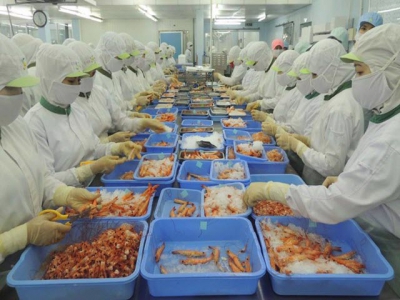Seafood production in south tumbling

According to a survey conducted by the Vietnam Association of Seafood Exporters and Producers (VASEP) at the end of August, only 30-40 per cent of seafood enterprises in southern cities and provinces are currently operating. It is estimated that seafood production capacity in the south has fallen by 60-70 per cent compared to the same period last year.
According to the Vietnam Association of Seafood Exporters and Producers (VASEP), in August 2021, seafood exports reached about US$520 million, down 36% over the same period last year and down in most key products. The picture in September is still bleak. In which, the production and processing of pangasius is still being heavily affected, the situation of pangasius exports is difficult to improve this month. It is forecasted that seafood exports in September will continue to decrease by at least 20%, reaching about 660 million USD.
From the end of July 2021, up to 50% of pangasius enterprises in some key provinces in the Mekong Delta have to close. The decrease in raw fish prices is due to the fact that many processing factories have limited purchases due to reduced capacity or temporarily closed due to the epidemic. Pangasius enterprises said that the biggest difficulty of processing factories is implementing "3 on the spot" because too many costs are incurred, labor and wages increase, transportation of raw materials and goods is difficult. many difficulties; employees do not want to follow this option...
In other localities such as Can Tho, Vinh Long..., the supply of pangasius for export is abundant, but the processing factory also stopped working or reduced capacity, so it temporarily stopped buying raw materials, causing fish prices to drop. That is also the reason for reducing the area of intensive farming of pangasius, it is forecasted that this trend will continue in the coming time. The operating capacity of the whole pangasius industry is about 10-20%.
Similarly, the Department of Agriculture and Rural Development of Ca Mau province also acknowledged that the shrimp production chain is difficult from input materials, seed to processing factory. Ca Mau currently has 30 enterprises and 38 shrimp processing factories, with an output of 200,000 tons/year. When implementing "3 places", "1 route 2 destinations", most businesses are not ready. Although supported, only about 30-50% of enterprises and factories can meet the requirements for production, the rest have to stop operating. Up to this point, the capacity is only about 50%.
It can be said that in the Mekong Delta, there is a paradox: farmers do not sell products, businesses cannot buy products. Therefore, according to the survey results of VASEP, only 30-40% of enterprises have enough capacity to resume production immediately after the end of social distancing, the remaining enterprises are very difficult or need a long time. to resume production.
The production recovery of enterprises is being greatly affected by reasons such as: The supply chain of raw materials is broken, or difficulties in transportation; Enterprises lose customers due to the delay in implementation time, delivery schedule is not guaranteed... Especially, it is difficult for enterprises to gather the workforce like the original because workers have not been vaccinated, so they can't yet to the production facility, has returned to his hometown, is in isolation, or is being treated for Covid ...
In addition, the policy of many provinces and cities is implementing Directive 16 along with focusing only on anti-epidemic goals, so the ability to recover production is very difficult, if the distance is continued until mid-September 2021. then the risk of chain breakage is very high and it is difficult to restore production to normal.
This survey by VASEP also shows the effects of the disease on raw materials for production. The source of raw materials greatly affects and determines the price of products, however, due to the influence of the epidemic and regulations on distance, seafood enterprises cannot mobilize raw materials, and raw materials are congested, so the price is high. Aquatic products have decreased sharply, people do not continue to raise livestock… It is forecasted that the source of raw materials from farming will be 20-30% short and the price of raw materials will increase by 10-20% in the last months of the year.
By the end of August 2021, up to 40-50% of orders were delivered late and about 10-15% of orders were cancelled. In addition, many importers expressed concern that they would still keep orders in the immediate future, but might consider finding alternative sources of supply.
According to the surveyed businesses, in case businesses can return to normal production after easing the distance (after September 15), the ability to get orders for the year-end holiday season is also very limited. According to the survey results, by the end of August 2021, the rate of vaccination (1st dose) for seafood workers in the South and Mekong Delta reached an average of 30-40%, no businesses have been vaccinated. nose 2.
Có thể bạn quan tâm
 Vietnam is the third largest seafood supplier of Japan
Vietnam is the third largest seafood supplier of Japan Vietnam’s seafood imports into Japan increased in quantity for the first eight months of this year. Vietnam is currently the third largest supplier
 Tuna exports to China increase sharply
Tuna exports to China increase sharply Tuna exports to China have grown strongly, although many markets of Vietnamese tuna were affected by the Covid-19 epidemic.
 A sharp increase in black tiger shrimp exports to Spain
A sharp increase in black tiger shrimp exports to Spain Black tiger shrimp exports to Spain sharply increased in the first nine months of 2021, making a great impact on the growth of seafood exports to this market.